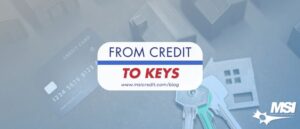The first step to a good credit score is being current. Every time a late payment of 30 days or more is reported your credit score will be negatively affected. Consequently, your credit score will decrease and if late payments persist, your account will also be at risk of being charged off.
Tip: If you are behind catch up! It is best to set up auto draft payments. This will assure you payments are made on time. Also don’t forget to update your payment information should you change banks or be issued a new credit/debit card.
Keep your balances paid close to zero
Be sure to keep a low credit card balance. Any balances over 30% of your available credit limit are seen as a risk which can consequently lower your score. This can communicate that you may be struggling to make ends meet and may have more debt that you can handle.
Tip: Only charge balances you can manage to pay off to zero! This will assure your payment does not go over your limit, avoids over the limit fees, saves you money from interest fees, and avoids the risk of your score being lowered.
Keep your credit card open
Your credit score benefits more as your accounts age. This shows financial responsibility on your end. This is why a credit card is very important as they are revolving accounts. In comparison, loans are installment accounts and have terms that will eventually end once the payment is satisfied in full.
Tip: Leave your dormant credit card open. As long as the credit card balance is at zero and the account continues to age on your report, you will continue to benefit from its history. Although it is also best to check with your creditor if there are any terms in regards to accounts being closed. Don’t have an opened credit card? Apply for a secured credit card to start building history.
Avoid applying for unnecessary lines of credit
Every time you apply for a line of credit, an inquiry is placed on your credit report. Credit inquiries also affect your credit score and can consequently lower your score. This is seen as a risk as it may communicate that you need funds that you may not have and cannot afford to make ends meet.
Tip: This is especially important around holiday time. Retailers will try to reel you in to apply for their store credit cards for an additional percentage off. Remember that every time you say yes, an inquiry will be placed whether you are approved or not.
Live life and balance your credit
As you go on with life, situations will arise where lines of credit will be needed. These lines will be things such as needing a car or obtaining your dream home. Work up to a healthy mixture of credit. It is important to show you are financially responsible and able to handle different kinds of revolving and installment accounts. A healthy mixture of credit is three revolving accounts (credit cards) to one installment (loan).
Tip: Do not go on a credit binge. Keep in mind of the credit inquiries we discussed. If you have a minimum of one credit card opened you will always have that line of credit working for you and building history for you.
Remove incorrect and invalid negative items
Items such as late payments, collections, public records, etc. hurt your credit scores. Remember your track record is 35% of your score and these items are considered when your score is calculated. Audit these items with the three credit bureaus: Equifax, Experian, and TransUnion. Be sure to also audit the items with the original creditor and the collection agency who owns the account. Through an investigation you may find some items are resolved and/or removed from your credit report.
Tip: Is the dispute process difficult for you to understand or complete? Hire professional help. Companies such as MSI Credit Solutions can work on your behalf to resolve these issues.
 MSI Credit Solutions provides superior credit restoration and comprehensive consulting services that are reliable and affordable. For any questions or to schedule a free credit consultation, contact us at (866) 217-9841.
MSI Credit Solutions provides superior credit restoration and comprehensive consulting services that are reliable and affordable. For any questions or to schedule a free credit consultation, contact us at (866) 217-9841.
*The information in this article has been provided strictly for educational purposes.




